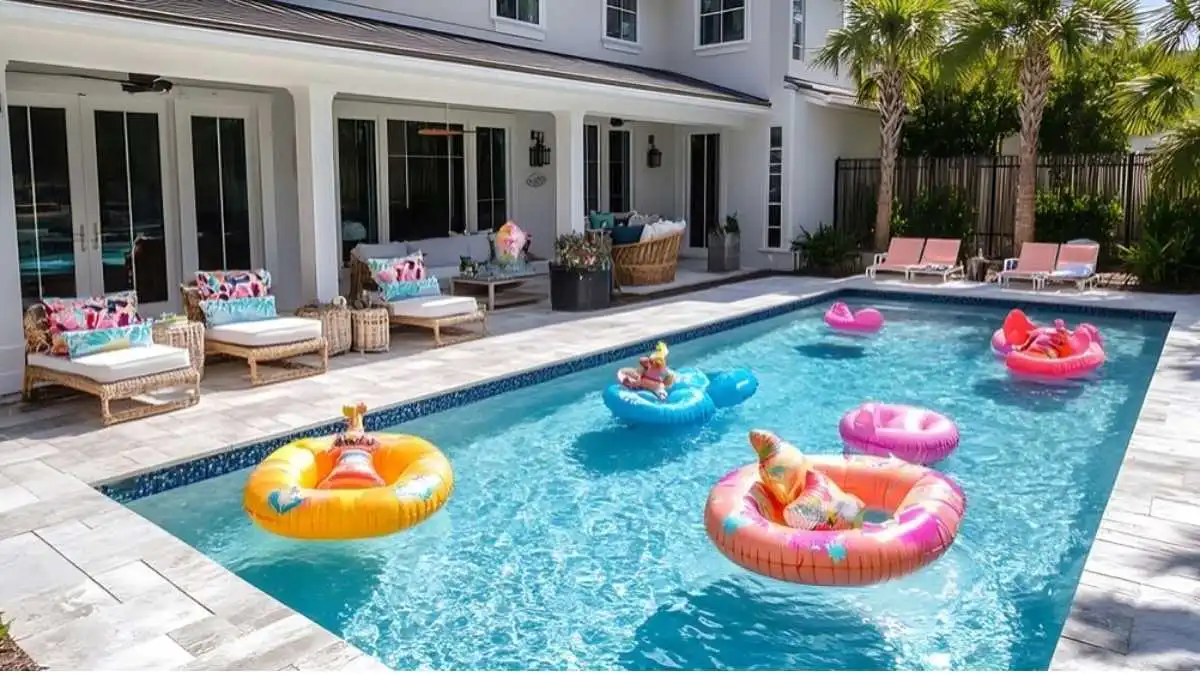HOME IMPROVEMENT
Backyard Pools: A Path to Better Health

Investing in a backyard pool is often seen through the lens of luxury or entertainment, but its value extends well beyond aesthetics and leisure. A residential swimming pool offers a wide range of health benefits that can positively impact physical fitness, mental well-being, and overall quality of life. For individuals, families, and property developers looking to align amenities with long-term value, a backyard pool represents a unique intersection of wellness and utility. Understanding the full spectrum of its health-related advantages makes the case for pool ownership stronger than ever.
Table of Contents
Physical Health Benefits and Low-Impact Exercise
One of the most compelling arguments for owning a pool is its ability to support physical activity in a way that is both effective and accessible. Swimming is a full-body, low-impact workout that strengthens the cardiovascular system, builds muscle, improves flexibility, and burns calories without placing undue stress on joints. For individuals recovering from injury, managing arthritis, or living with mobility challenges, aquatic exercise provides a safe and supportive environment that traditional workouts often cannot match.
Regular pool use also promotes consistency in physical activity, as the convenience of having a private facility eliminates many common barriers to exercise, such as travel time, weather conditions, or gym schedules. Families benefit as well, with children engaging in play that doubles as physical activity, and adults incorporating swimming or aquatic training into their daily or weekly routines. When compared to the cost and time investment of gym memberships or speciality fitness classes, a pool can become an efficient, all-in-one health resource right at home.
Mental Wellness and Stress Reduction
Beyond physical fitness, the presence of a backyard pool contributes significantly to mental and emotional well-being. Water has long been associated with relaxation and stress relief, and simply being near or in water can trigger the body’s parasympathetic nervous system, responsible for calming the mind and reducing anxiety. Regular swimming has been shown to decrease levels of cortisol, the stress hormone, while increasing endorphin production.
A pool also provides an opportunity to disconnect from screens, noise, and digital distractions, creating a calm space for reflection, meditation, or social bonding. This is especially relevant in today’s always-connected environment, where the need for intentional rest and recovery is more important than ever. Evening swims, morning laps, or even just sitting poolside with a cup of coffee can serve as wellness rituals that ground and recharge.
In the context of family life, pools encourage shared experiences and outdoor activity that strengthen relationships and build healthy habits. Children and teens benefit from screen-free recreation, while parents could model balanced, active living. The cumulative effect on household wellness can be both immediate and lasting.
Year-Round Use and Customization for Health Goals
Modern pool design has evolved to accommodate year-round wellness use, even in regions with seasonal changes. Heated pools, retractable enclosures, and adjacent spas or hydrotherapy areas allow owners to continue aquatic activity during colder months. For individuals with specific health goals, pools can be outfitted with resistance jets for swimming in place, built-in treadmills, or shallow zones for aqua yoga or rehabilitation exercises.
Customization ensures that a pool is not just a leisure feature, but a personal wellness facility tailored to individual or family needs. This flexibility makes backyard pools a particularly strategic investment for those prioritizing health and longevity. For developers or property planners, offering pool-equipped homes or shared residential pool spaces supports a growing demand for wellness-centred living environments.
Strategic Planning and Financing Options
While the health benefits of pool ownership are clear, the financial aspect must also be thoughtfully considered. Costs vary depending on size, design, and materials, and should be weighed against the long-term value offered in terms of wellness, property appreciation, and lifestyle enhancement.
Fortunately, there are a variety of tools available to help homeowners and investors plan effectively. Using a pool financing calculator allows for accurate projections of monthly payments based on loan terms, interest rates, and budget constraints. This level of transparency is especially useful when integrating pool installation into broader property improvement or development projects.
For those looking to finance a pool, many lenders offer specialized loan products with competitive rates and flexible terms. Exploring these options early in the planning phase ensures that pool investments remain aligned with both financial and health goals.
Conclusion: A Lasting Investment in Wellness
A backyard pool is more than an architectural feature it is a long-term investment in health, well-being, and quality of life. From improving physical fitness to reducing stress and promoting family connection, the health advantages of pool ownership are wide-ranging and well-documented. As interest in wellness-focused living continues to rise, adding a pool to a residential property offers not only personal benefits but also a competitive edge in real estate and development planning. Thoughtfully designed and strategically financed, a backyard pool can deliver measurable returns in both health and value for years to come.
-

 GENERAL7 months ago
GENERAL7 months agoChristofle – For Those Who Dream of Family Heirloom Silver
-

 SPORTS9 months ago
SPORTS9 months agoDiscover the World of Football with Streameast: Watch Your Favorite Leagues and Tournaments
-

 GENERAL3 weeks ago
GENERAL3 weeks agoUncovering the World of кинокрадко: The Dark Side of Film Piracy
-

 GENERAL3 months ago
GENERAL3 months agoATFBooru: Anime, Gaming, and Subculture Imageboard


























